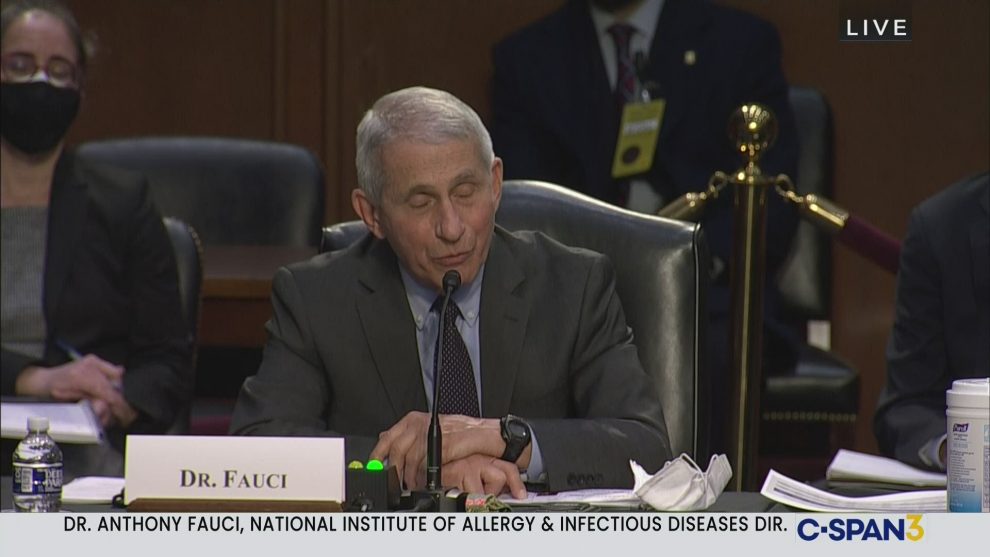Sen. Ron Johnson (R-WI) grilled Dr. Anthony Fauci over his evolving view about the origins of the coronavirus pandemic and if the virus emerged from the Wuhan Institute of Virology, according to a letter obtained exclusively by Breitbart News.
Johnson sent the letter to Fauci, the director of the National Institute of Allergy and Infectious Diseases, on Thursday after Fauci appeared to change his view about the origins of the coronavirus.
Fauci said in May 2020 the coronavirus definitively came from natural origins, Johnson noted.
“If you look at the evolution of the virus in bats, and what’s out there now is very, very strongly leaning toward this [virus] could not have been artificially or deliberately manipulated,” Fauci said.
Now roughly one year later, Johnson said Fauci “appeared to be less confident that the virus originated in nature.”
Fauci said in May 2021:
No, I am not convinced about that. I think that we should continue to investigate what went on in China until we find out to the best of our ability exactly what happened. Certainly the people who investigated it say it likely was the emergence from an animal reservoir that then infected individuals but it could have been something else.
Johnson then noted Fauci raised even more ambiguity about the virus’s origin after he told a reporter it is “highly likely” the virus came from nature; however, he said, “No one is 100 percent sure.”
“The ambiguity of your recent statements about the virus’ origins raises questions regarding your assertion from a year ago when you confidently stated that the virus could not have been manipulated and that it occurred naturally,” Johnson said.
Johnson also said Fauci’s May 2020 statement raises concerns after he rejected a theory that suggested the virus originated from the Wuhan Institute of Virology (WIV).
He wrote:
Further, your high level of confidence in rejecting a potential laboratory origin in May 2020 is perplexing, given that public reports highlighted safety concerns at the Wuhan Institute of Virology (WIV). Specifically, on April 14, 2020, the Washington Post published an article about information contained in two 2018 State Department cables where U.S. diplomats expressed concerns about the safety of the Wuhan laboratory.
It is not clear whether you had knowledge of the safety concerns at the WIV when you made your statement on the virus’ origins in May 2020. It would be troubling if you were not aware of those concerns, given that taxpayer money went to the laboratory through a National Institute of Allergy and Infectious Diseases grant.
It would also be troubling that if, at the time of your statement in May 2020, you were aware of the concerns raised in these cables, and yet, you still dismissed the possibility thata laboratory could have played a part in the origins of SARS-CoV-2.
Therefore, Johnson requested that Fauci answer the following questions:
1. Please explain what evidence you relied on in asserting in May 2020 that the SARS-CoV2 virus was more likely to have emerged from a natural origin.
2. Please explain what evidence you relied on in May 2020 to reject the possibility that the virus originated in a laboratory.
3. Please indicate what, if any, knowledge you had about the 2018 State Department cables. If you had knowledge of those cables did you factor the safety concerns at the WIV into your May 2020 assertion about the virus’ origin? Please explain what evidence led you to lowering your confidence in a natural origin for SARS-CoV-2 on May 11, 2021.
4. Please explain what evidence you relied on in determining on May 24, 2021 that it is still “highly likely” that SARS-CoV-2 is of natural origin.
5. Please explain what information and data you relied on to determine that the potential laboratory origin of SARS-CoV-2 is not as likely as a natural origin.
6. Please specify when you concluded that the virus’ origins should be thoroughly investigated.
Fauci has come under increasing criticism for his evolving statements about the origins of the coronavirus pandemic.
Fauci admitted Tuesday the National Institutes of Health (NIH) funded the Wuhan Institute, but denied that NIH taxpayer funds went to the Chinese institute to facilitate gain of function research. Gain of function research involves “taking a virus that could infect humans and making it either more transmissible and/or pathogenic for humans.”
Story cited here.
























